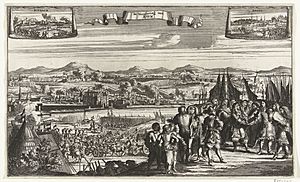Siege of Bonn (1673) facts for kids
Quick facts for kids Siege of Bonn |
|||||||
|---|---|---|---|---|---|---|---|
| Part of the Franco-Dutch War | |||||||
 |
|||||||
|
|||||||
| Belligerents | |||||||
| Commanders and leaders | |||||||
| Strength | |||||||
| 60,000 men | 2,000 men | ||||||
| Casualties and losses | |||||||
| Unknown | Unknown | ||||||
The Siege of Bonn was an important battle that happened a long time ago, from November 3 to November 12, 1673. It took place in a city called Bonn, which is now in Germany. This event was part of a bigger conflict known as the Franco-Dutch War. During a siege, an army surrounds a city or fort and tries to take control of it. In this siege, different countries worked together to capture Bonn.
Contents
What Was the Siege of Bonn?
The Siege of Bonn was a key moment in the Franco-Dutch War. This war was fought between France and its allies against the Dutch Republic and its allies. In 1673, the Dutch and their friends decided to attack after pushing back the French army. They chose to surround Bonn.
Who Was Involved in the Siege?
The city of Bonn was defended by soldiers from France and the Electorate of Cologne. The Electorate of Cologne was a state in the Holy Roman Empire at that time.
The attacking forces were a team of armies, also known as "allies." These allies included:
- The Dutch Republic, led by their stadtholder, William III of Orange. A stadtholder was like a chief executive or leader.
- The Holy Roman Empire, with commanders like Raimondo Montecuccoli and Johann von Sporck. The Holy Roman Empire was a large group of lands in Central Europe.
- Spain, which was also allied with the Dutch and the Holy Roman Empire.
Why Was Bonn Important?
Bonn was an important city because of its location. It was a key place for armies to control during the war. Taking Bonn would help the allied forces gain an advantage over France and its allies.
What Happened During the Siege?
The allied armies surrounded Bonn on November 3, 1673. They attacked the city for nine days. A siege usually involves cutting off supplies and bombarding the city walls until the defenders give up. The allied forces had a much larger army, with about 60,000 soldiers, compared to the 2,000 defenders inside Bonn.
What Was the Result of the Siege?
After nine days of fighting, the allied forces successfully captured Bonn on November 12, 1673. This was a big victory for the Dutch Republic and its allies. It showed that they were able to push back against the French army.
Bonn was later involved in another major siege in 1689, which was part of a different war.
 | Bessie Coleman |
 | Spann Watson |
 | Jill E. Brown |
 | Sherman W. White |

